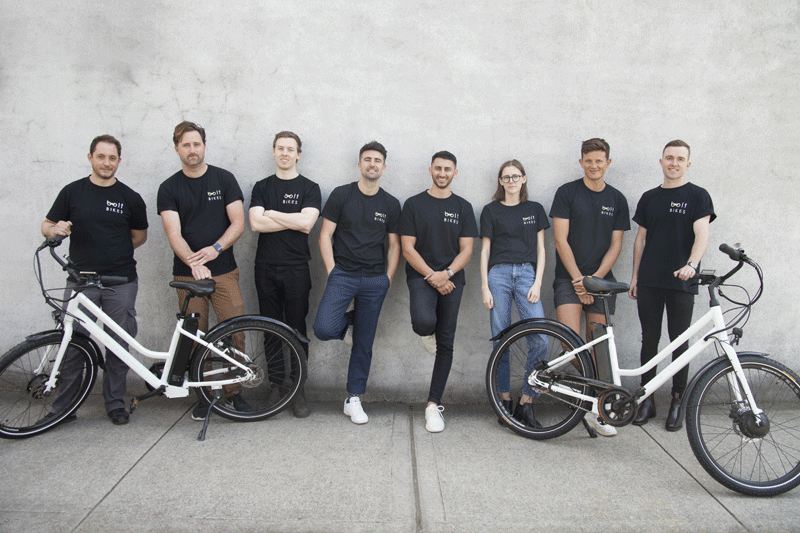As the e-scooter craze begins to subside 20 years after Segways first promised to change our world, electric bicycles built to haul cargo might actually deliver on this lofty claim. Battery-powered two-wheelers will soon be ferrying groceries and Amazon boxes throughout dense, urban environments, a former Deliveroo exec who founded the Bolt e-bike company, Mina Nada, says the biggest opportunity is in delivering prepared meals.
The keys to Bolt’s future impact lies in the details of the business model, which was designed to avoid the pitfalls, regulatory hurdles and economic barriers keeping third-party delivery drivers dependent on the automobile. Because a typical 3,500-pound car can be too big and expensive to drive profitability in the meal delivery space—both for the drivers and the brands that pay them—Nada argues that leasing custom-built electric bikes to drivers is the game-changer the meal-delivery industry has been waiting for.
Think of a typical driver rushing to grab an order from the next restaurant. Hoping to get in and out in a hurry, drivers often throw on the flashers and park illegally to quickly get rolling to the hungry consumer. That’s a pain for pedestrians and traffic cops, but also the drivers shouldering a second sack of expenses that includes gas, car payments and maintenance, but also insurance and depreciation that further reduces their earnings. It all adds up, and weakens the industry’s appeal as the third-party networks struggle to become profitable.
Noting all the political hand-wringing and complaints about e-scooters on city streets, sidewalks and bike paths, Nada says that rolling controversy opened the world’s eyes to the potential of light, battery-powered vehicles replacing bigger petrol-based cars.
“There is a strong future for these lighter electric vehicles to be solving many problems that, potentially, you don’t need a super-fancy, self-driving, two-ton car to solve if you can just get someone to jump on something with a small motor and maybe even pedal a bit themselves,” Nada said. “I’m convinced within five years there will be more personal electrically powered mobility devices in our streets than any other vehicle at all.”
Nada grew up in Sydney, worked at Bain & Company for three years, and then headed up Deliveroo’s Australian market, its third-largest behind the U.K. and France. After being promoted to the European delivery brand’s Head of Global Tactical Operations, Nada was then recruited to Mobike, a Chinese company that calls itself the world’s first and largest smart bike sharing company.
Speaking of his time at Deliveroo, he said that ongoing challenges to keep up with the supply of couriers opened his eyes to the potential of last-mile electric bikes. “What I came up with and pitched to Deliveroo at the time was, why don’t we lease out vehicles to these guys so they can rent them themselves—but Deliveroo wasn’t interested in that.” Since founding Bolt in late 2017, Nada has focused on rental, which has a variety of advantages compared with asking couriers to shell out $2,000-$3,000 on an electric bike.
Since founding the company with fellow Bain-er Michael Johnson, Nada has met with DoorDash, Uber and Deliveroo while growing the company to more than 25 employees after a $2.5 million investment in 2019. With some Postmates, Uber and DoorDash drivers now using Bolts on a test basis in western states, early findings show battery-powered, bike-riders are the fastest drivers in their respective fleets.
Looking ahead, he expects to soon announce another investment “that’s substantially more” than the first round, and points to Amazon purchasing 100,000 Rivian electric trucks, as well as UPS and Amazing preparing massive fleets of electric vans, as a glimpse of the changes soon appearing on city streets and enticing investors.
“All these companies need a much more scalable solution to support them with their immediate objectives, so I think people are seeing that story and getting into it, and I think it’s less of a food delivery story and more of a mobility angle.”
While Bolt remains fixed on purpose-built bicycles, Nada said that grocery is another appealing market, and one that will have different requirements for the vehicles compared to something designed to only carry a few meals at a time.
“We’re building a platform that will be able to service the entire industry for last-mile logistics,” he said. “It’s a great solution for cities that lack great public transport, which is a lot of cities in the U.S. and a lot of the cities in Australia. It will take time for regulators to [latch] onto that and to take the whole thing seriously—obviously the government doesn’t move at the same pace as Silicon Valley.”


